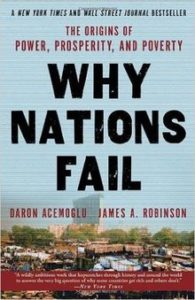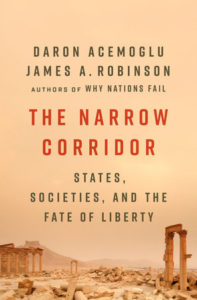What will the post-Covid state look like? For citizens in the world’s democracies, the choice ultimately will be between various forms of abdication and concerted action, says a leading analyst.
The world is experiencing one of the most transformative moments of the last 75 years, argues Daron Acemoglu, Professor of Economics at MIT, and co-author (with James A. Robinson) of Why Nations Fail: The Origins of Power, Prosperity and Poverty and The Narrow Corridor: States, Societies, and the Fate of Liberty.
 The conditions in which we find ourselves amount to what James A. Robinson and I would call a “critical juncture.” In our 2012 book, Why Nations Fail, we describe similar historical scenarios in which deep-seated instability lends itself to the possibility for sweeping institutional change, but without any clarity as to the likely direction of that change. History and current conditions suggest four possibilities, each with vastly different economic, political, and social implications, he writes for Project Syndicate:
The conditions in which we find ourselves amount to what James A. Robinson and I would call a “critical juncture.” In our 2012 book, Why Nations Fail, we describe similar historical scenarios in which deep-seated instability lends itself to the possibility for sweeping institutional change, but without any clarity as to the likely direction of that change. History and current conditions suggest four possibilities, each with vastly different economic, political, and social implications, he writes for Project Syndicate:
- The first is “tragic business as usual,” in which… we make no serious effort to reform our failing institutions, or address the economic and social inequities that have become endemic. We neither strengthen the role of expertise and science in decision-making, nor take steps to boost the resilience of our economic, political, and social systems. We simply accept today’s deepening polarization and collapsing public trust. This path is highly likely if our leaders do not understand the severity of the problem, or if we cannot organize ourselves to demand from them the necessary reforms. ….One way or another, democratic politics will start coming apart at the seams, and something even worse than populist nationalism would likely emerge to fill the void.
- The second possible path is “China-lite,” which has become increasingly likely for the “Hobbesian” moment we are now living through. …Western democracies would try to emulate China by worrying less about privacy and surveillance, while permitting more state control over private companies. After all, one of the standard narratives to have emerged from the pandemic is that China’s pre-existing infrastructure for snooping and social control enabled it to respond to the virus faster and much more effectively than the US has. One could also imagine citizens in advanced economies deciding that democratic governance is too inefficient or unwieldy for dealing with the challenges of a globalized, interconnected world.
- The third trajectory leads to tech dominance or “digital serfdom.” To return to the example of the US, imagine that America, as a society, recognized the need for widespread coordination, but lost still more trust in government and public institutions….As more and more of these technologies come to seem indispensable, the private companies behind them will amass more power; and in the absence of a viable state-based alternative, the public might voice few objections. The same firms will, of course, continue to collect personal data and manipulate users’ behavior, but they will have even less to worry about from the government, which would become a kind of subservient handmaiden to Silicon Valley….
 Fortunately, the fourth option – “welfare state 3.0” – could lead toward a brighter horizon. …Pretty much everyone agrees that governments need to shoulder more responsibility, while also becoming more efficient. It is also safe to assume that the pandemic-era expansion in spending, regulation, liquidity provision, and other interventions will become permanent to some degree (though it will eventually have to include expanded taxation, too). But this larger government would be fundamentally different from the DMV state in the China-lite scenario. As the state grows stronger, so, too, would democratic institutions and mechanisms of political participation adequate to monitoring its actions and holding it accountable.
Fortunately, the fourth option – “welfare state 3.0” – could lead toward a brighter horizon. …Pretty much everyone agrees that governments need to shoulder more responsibility, while also becoming more efficient. It is also safe to assume that the pandemic-era expansion in spending, regulation, liquidity provision, and other interventions will become permanent to some degree (though it will eventually have to include expanded taxation, too). But this larger government would be fundamentally different from the DMV state in the China-lite scenario. As the state grows stronger, so, too, would democratic institutions and mechanisms of political participation adequate to monitoring its actions and holding it accountable.
“At a time of unparalleled polarization, crumbling democratic norms, and dwindling institutional capacity, a reformed and renewed welfare state is a tall order indeed,” Acemoglu adds. “But like the WWII generation, we have no other choice but to try.”
It’s out in the open: democracies contain epidemics most effectively. People living under freely elected governments have been more responsive to lockdown measures, The Economist reveals.
Transforming political parties in the middle of a pandemic is an uphill task. So is this the moment for online voting? International IDEA analyst Alberto Fernandez Gibaja asks.

 The Covid-19 pandemic poses a
The Covid-19 pandemic poses a 





